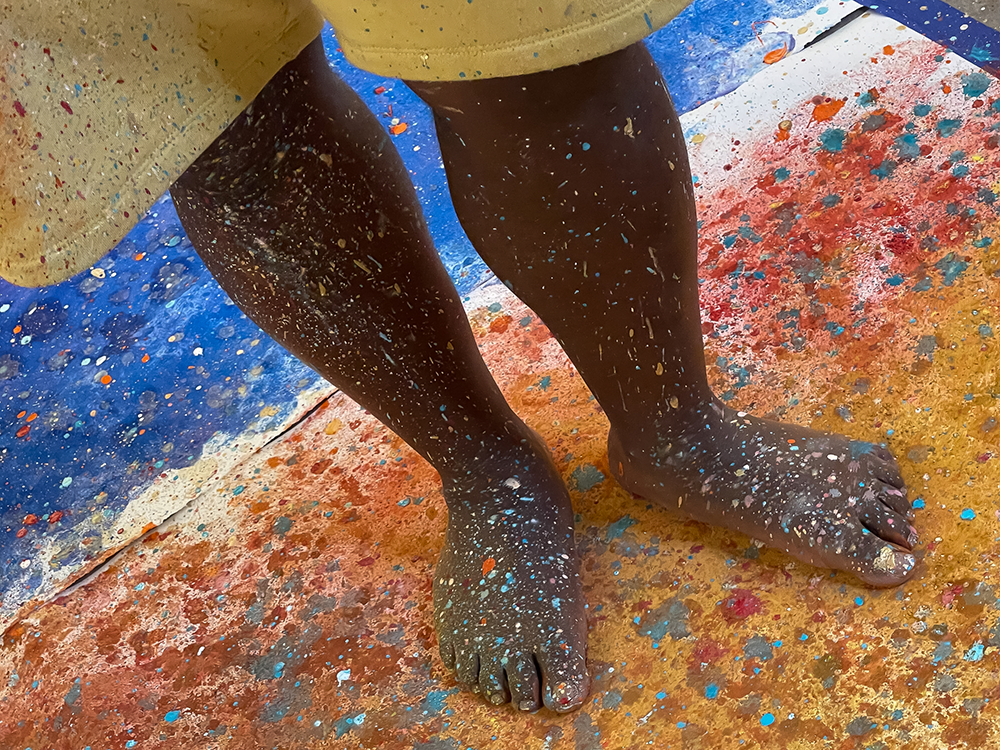
Arts and the American South
Keohane Distinguished Visiting Professor on reconnecting people to place
“We Black folks are a land-based people who must rediscover our relationship to land,” asserts artist and scholar Ashon T. Crawley. “I do not think it can be said that we Black people are ‘of’ the urban north. Even in the urban north, we are a southern land people.”
Crawley is the 2024-25 Nannerl Keohane Distinguished Visiting Professor at Duke and UNC Chapel Hill. “One of the things I’m trying to work through is that we’re all southern people,” he said. “Our relation to the land is what we need to rediscover.”
“This year’s theme for the Keohane Visiting Professorship is ‘Arts and the American South,’” said Ed Balleisen, vice provost for interdisciplinary studies at Duke. “It’s an area with a great deal of vitality on both our campus and at UNC Chapel Hill.” Campus hosts are Duke Arts, led by John Brown, and UNC’s Center for the Study of the American South, directed by Blair L.M. Kelley.
Crawley has been engaging with students and faculty on both campuses and presenting a series of public events on the theme of “Otherwise, We Are Down South Folk — Dirt, Water, Air.”
In his opening public lecture, he spoke on the importance of dirt and soil to the making of Black life. “I love the smell of rain in the summertime in the south, even though I’m very much a northern boy,” Crawley said. “Old habits and ideas die hard.”
Thinking through “Cancer Alley” — the 85-mile rural stretch of fossil fuel and petrochemical plants in Louisiana — Crawley discussed how this “corporate approach is an extractive approach to landscape. What does it mean when we know that neighbors have miscarriages because of extractive practices?” he asked.
“This presumption that we can control the Earth and the weather is incorrect. The impact is felt most prominently within the Black community. These industries are not naturally occurring things created in the wild. What is it we think the land is, that this could be done to it?”

In his second public event, Crawley continued to explore how the built environment and land use has been used for exploitation and harm of Black and Indigenous people and the Earth itself.
Delving into the polluting and degrading of air, Crawley brought up the example of cloud storage, metaphorically assumed to be in the air but actually a place where computers are packed together, creating excessive heat. “Data centers overwhelmingly rely on air conditioning. Training a large language model can produce air pollution. Air is susceptible to these various harms. We have to have a different relationship to voice in order to speak back to this violence,” he said.
“What we must remember is that we are all deeply interconnected. We should not have a controlling relationship to any living thing, including ourselves.”

AGNOSTICOSTAL
Wednesday, April 2, 7:30 p.m., Hayti Heritage Center, Durham
AGNOSTICOSTAL is a performance lecture in which Crawley practices the breath, the gestures, the spiritual seriousness of Black folks, of Blackpentestalism, of Black social life. “Shouting,” a choreography of praise and worship in the Blackpentecostal tradition, will be immortalized on canvas as Crawley paints with pigment powder, acrylic paint and ink using hand clapping, foot stomping, a tambourine and movement of the body to visualize the intensity and fervor of spiritual practices. With a live soundtrack provided by the sounds of the Hammond B-3 organ, played by Charles “Chuddy” Smith, vocals by Ashley Howard and the downbeat by drummer Rodney “Rod” Jones, Crawley will engage a devotional practice of praise and worship live for, and with, an audience.

About Ashon Crawley
Crawley holds a Ph.D. in English from Duke and is professor of religious studies and African American and African studies at the University of Virginia. His research and teaching experiences range from Black studies, performance theory, sound studies, philosophy and theology to Black feminist and queer theories. The author of “Blackpentecostal Breath” and “The Lonely Letters,” he is working on a book about the impact of the AIDS crisis on Black social life.
His work has been featured on the National Mall in Washington, DC, at Second Street Gallery and Welcome Gallery in Charlottesville, and at Bridge Projects and the California African American Museum in Los Angeles. Crawley has received arts fellowships from Yaddo, MacDowell, New City Arts and Learning It Together (LIT).
About the Keohane Professorship
The Nannerl Keohane Distinguished Visiting Professorship brings prominent scholars to UNC Chapel Hill and Duke for a one-year period, during which they deliver a lecture series and engage students and faculty around areas of shared interest to both institutions.
Created in 2004 by James Moeser, who served as UNC’s chancellor at the time, the professorship recognizes Keohane’s contributions during her term as Duke’s president and seeks to strengthen the collaboration she and Moeser built between the two institutions.
The professorship was funded by the late Josie and Julian Robertson (parents of Spencer Robertson, Duke ’98, and Alex Robertson, UNC ’01) and the William R. Kenan, Jr. Charitable Trust.
Last year’s recipient was Brett Ashley Kaplan, director of the Initiative in Holocaust, Genocide and Memory Studies at the University of Illinois Urbana-Champaign.
Main image: Ashon Crawley during a Left of Black interview with Mark Anthony Neal, October 2024 (Image: Jakiah Glass)